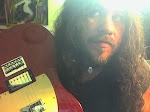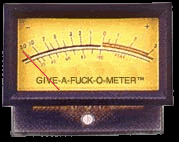Gibson Leads Industry Fight Against Counterfeit Gibsons
Ellen Mallernee | 06.06.2007
Last year, 15-year-old Jonathan Jakubowski of Cary, North Carolina emptied out his savings account to purchase a Les Paul he found advertised in the local newspaper.
Of his decision to buy a Gibson, Jakubowski explains, “Eric Clapton is my main influence, and he played Les Pauls for a long time.”

Intending to purchase the advertised Les Paul Standard, Jonathan and his father visited the seller at his house, where they were persuaded instead to purchase a Wine Red Les Paul Custom, which the man said he’d bought off a traveling musician. Jonathan paid the man $1,000 for the guitar, but once he got it home, he could tell that something wasn’t right.

“I’d only played Les Pauls in the guitar shops, but something tipped me off, and I ended up going on the Internet to see what some typical signs are for a fake guitar,” Jakubowski says. “The first thing that struck me was that there were three screws in the truss rod cover instead of two.”
The staff at a local guitar shop confirmed Jakubowski’s suspicions—the guitar was a counterfeit. The high school sophomore alerted police, and following an investigation, the North Carolina man who’d acquired the guitar from a Chinese website and resold it to Jakubowski was arrested on two felony counts of criminal use of a counterfeit trademark.
This is but one of several reports that have prompted Gibson to lead an aggressive industry fight against the growing problem of counterfeit instruments being shipped from and sold by outlets and individuals in China.

“Protecting our consumers’ investments and the Gibson name is paramount,” says Ric Olsen, Director of Security and Loss Prevention at Gibson. “The ultimate goal here is that we want people to be happy Gibson customers. We’re trying to protect their investments by thwarting the counterfeit problem.”
The majority of the Gibson counterfeits appear to originate on e-commerce sites based out of major cities in China such as Beijing and Shanghai, though Olsen says, “That’s not to say we don’t have domestic problems, too. People will try to make up their own version of a Les Paul and start selling it, but the major battle is this China crisis.”

Other sources for counterfeit instruments are auction websites like eBay, which currently have hundreds of instruments resembling not just Gibson guitars, but also other brands. Some even feature trademarked headstocks and logos, but upon close inspection the guitars don’t feel or sound like a true Gibson, the serial numbers aren’t registered with Gibson, and most are not of good standard of quality overall.

Pricing can also be one of the easiest giveaways for a phony guitar. If a guitar is up for an online auction at a fraction of what it would typically cost, consumers are taking a great chance by purchasing it. Consumers should also be wary of sales that offer exorbitant shipping prices that exceed the price of the guitar.
Still, Olsen cautions that it can be difficult for a non-professional to distinguish between fake and real.

“There were victims who really had no idea what they were getting was fake,” Olsen says. “Until you actually plug the piece in or take the truss rod cover off and notice that there’s Teflon in there rather than the metal nut, it can be hard to tell to many consumers.”
With so many variables to take into account—the weight and finish of a guitar, the tone and playability, electronics and hardware, among other things, Gibson urges consumers to leave the detective work to its Customer Service department.
Though some guitars are especially deceptive, Gibson’s Customer Service Manager Jason Davidson says, “Usually we can spot a fake right away. They’re absolute garbage. They play terribly, they feel terrible. They are only made to look like a Gibson, and they do a poor job of that.”
To curtail the growing problem, Gibson advises all consumers to purchase Gibson instruments only from Gibson’s network of authorized dealers, found on the company’s website at www.gibson.com.

Consumers are also encouraged to contact Gibson’s Customer Service team, whether the guitar in question is new or used. “We have professionals that know these pieces inside and out,” Olsen says. “They know if a knob was the wrong year. They’ll know that a wire that was used was incorrect.” Consumers may even send Gibson Customer Service pictures of a guitar that they have questions about—full front and back photos and close-up shots of the front and back of the headstock are best.
“We will continue to do everything in our power to protect our consumers and the integrity of our family of brands,” says Henry Juszkiewicz, Chairman and CEO of Gibson Guitar. “We hope that by issuing this warning our consumers will be armed with the right information to protect themselves and understand what they need to do to ensure that what they are purchasing is indeed an authentic Gibson instrument.”
To report incidents, consumers should file a police report, and may also visit http://www.ic3.gov/.
For questions about a guitar’s authenticity, contact the Gibson Customer Service team at service@gibson.com or 1-800-4GIBSON.
How to Spot a Fake Gibson
To ensure the authenticity of a Gibson, consumers can check any of the references below when examining a guitar:
- Measure the guitar to check that it’s not undersized. Correct measurements can be found on www.Gibson.com.
- Examine headstock and headstock logo to determine that they match those of authentic Gibson guitars.
- Check to see that all pearl is inlaid.
- Check that Les Paul model script is always in cursive.
- Verify that there’s not a three-screw truss rod cover.
- Check the control and pickup cavities for sloppy routing or wiring.
- Make sure the pickup cavity is not painted black inside.
- Always ask for the Gibson Owner’s Manual and Gibson Warranty Inspection card.
- Check the wiring. If it’s plastic it isn’t a true Gibson.
- When all else fails, contact Gibson Customer Service at
1-800-4GIBSON.








